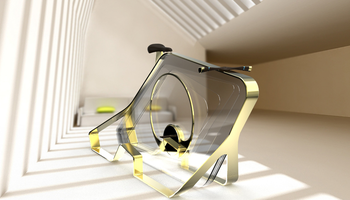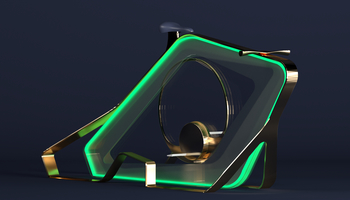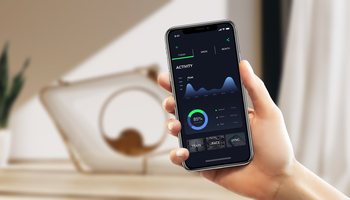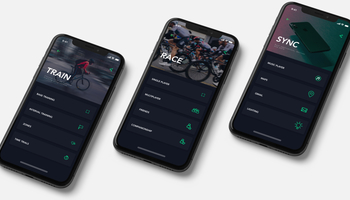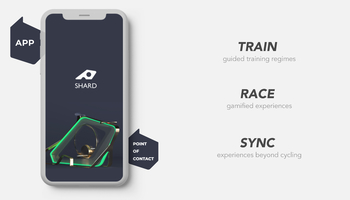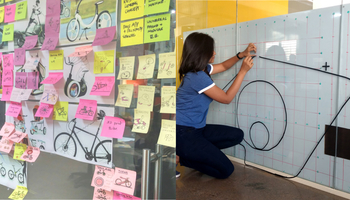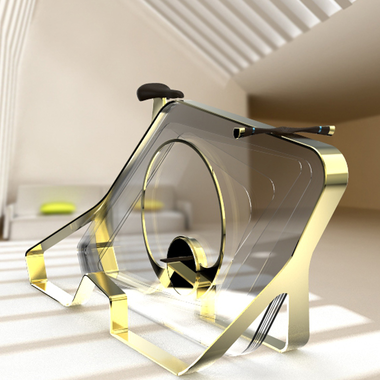

How do you view your workout results? The same philosophy was used to create the App interface as well as the other updates planned in terms of AR and VR attachments. Shard demonstrates a seamless blend of ID, IOT, and Interface design thus elevating the offering. Shard was created to emulate emotions that you experience when you look at an exquisite piece of art/Sculpture. To create this immersive experience, the UX moves away from the prevalence of screen and number based interface systems to an ambient interface. Shard influences behavior through ambient light that does not demand direct attention for consumption of information. Using ambient light to guide interactions based on input from sensors on the bike, data is also collected from the mobile app in the absence of key inputs thus ensuring a complete data-driven exercise regime. How it all began When we started the project, our main goal was to define a problem that needed a fresh perspective in the cycling industry. Going back to the basics, we looked at various experiences we have grown up with—like how we used to have the privilege of a sports inclusive education, but it eventually slipped away from our lifestyles as we grew older and moved into a more sedentary lifestyle of nine-to-five work life. For lack of more economical, yet motivating and interactive options, we turned to gyms to meet fitness needs. We researched and understood Exercise Psychology by identifying the need of self-determination as the key in motivating a user to workout. It was also understood that for a workout routine to be most acceptable, the communication needed to be non-controlling and information to be flexible. App development The UI/UX development had to be seamless, natural to any workout experience and integrated with the user's sensory capabilities and control modalities. The non-interfering and spatial qualities of light, along with the informative and mood enhancing qualities of color, made these two elements the core of Shard's user experience. Cycle Features Shard has two configurations—Cycling Mode and Standby mode. During Cycling Mode, the cycle connects to the user's phone via Bluetooth, and users have the option of selecting training regimes or racing options—both virtually and with other Shard users, integrated with speed indicative lighting. The application connects to other online applications and enables quiet but informative notifications that the user can manage by creating 'if this-then that' conditional statements. The cycle has heart rate and speed sensors which provide the input values to the app. The app, based on analytical algorithm, then gives feedback through light. Shard also has a feature that encourages the user to step out and enjoy the outdoors, It can give traffic and weather notifications in the morning without having you look through your phone. Shard communicates with the user only through lighting that can be adjusted according to intensity, color shades, and brightness. The equipment allows for intelligent lighting where sounds are captured and reflected with synchronized lighting effects. This feature also enables the user to create their own ambient lighting experience when in standby mode. How do you view your workout results? The same philosophy was used to create the App interface as well as the other updates planned in terms of AR and VR attachments. Shard demonstrates a seamless blend of ID, IOT, and Interface design thus elevating the offering. Shard was created to emulate emotions that you experience when you look at an exquisite piece of art/Sculpture. To create this immersive experience, the UX moves away from the prevalence of screen and number based interface systems to an ambient interface. Shard influences behavior through ambient light that does not demand direct attention for consumption of information. Using ambient light to guide interactions based on input from sensors on the bike, data is also collected from the mobile app in the absence of key inputs thus ensuring a complete data-driven exercise regime. How it all began When we started the project, our main goal was to define a problem that needed a fresh perspective in the cycling industry. Going back to the basics, we looked at various experiences we have grown up with—like how we used to have the privilege of a sports inclusive education, but it eventually slipped away from our lifestyles as we grew older and moved into a more sedentary lifestyle of nine-to-five work life. For lack of more economical, yet motivating and interactive options, we turned to gyms to meet fitness needs. We researched and understood Exercise Psychology by identifying the need of self-determination as the key in motivating a user to workout. It was also understood that for a workout routine to be most acceptable, the communication needed to be non-controlling and information to be flexible. App development The UI/UX development had to be seamless, natural to any workout experience and integrated with the user's sensory capabilities and control modalities. The non-interfering and spatial qualities of light, along with the informative and mood enhancing qualities of color, made these two elements the core of Shard's user experience. Cycle Features Shard has two configurations—Cycling Mode and Standby mode. During Cycling Mode, the cycle connects to the user's phone via Bluetooth, and users have the option of selecting training regimes or racing options—both virtually and with other Shard users, integrated with speed indicative lighting. The application connects to other online applications and enables quiet but informative notifications that the user can manage by creating 'if this-then that' conditional statements. The cycle has heart rate and speed sensors which provide the input values to the app. The app, based on analytical algorithm, then gives feedback through light. Shard also has a feature that encourages the user to step out and enjoy the outdoors, It can give traffic and weather notifications in the morning without having you look through your phone. Shard communicates with the user only through lighting that can be adjusted according to intensity, color shades, and brightness. The equipment allows for intelligent lighting where sounds are captured and reflected with synchronized lighting effects. This feature also enables the user to create their own ambient lighting experience when in standby mode.

